
Press critic Michael Massing reviews the Washington Post admission that it failed to raise criticisms of the Iraq invasion before the U.S. attacked last year. Executive Editor Leonard Downie Jr admited in the Post yesterday, “Across the country, the voices raising questions about the war were lonely ones. We didn’t pay enough attention to the minority.” [includes rush transcript]
The Washington Post yesterday published a major 3,000 word front-page story examining how the paper downplayed critics of the Iraq war before the U.S. attacked lat year.
Pentagon correspondent Thomas Ricks revealed how in October 2002 editors killed a piece of his titled “Doubts” that outlined how many senior Pentagon officials were reluctant about plans to attack Iraq. Ricks also added “The paper was not front-paging stuff. Administration assertions were on the front page. Things that challenged the administration were on A18 on Sunday or A24 on Monday. There was an attitude among editors: Look, we’re going to war, why do we even worry about all this contrary stuff?”
Executive Editor Leonard Downie Jr. admitted mistakes were made. He said “Across the country, the voices raising questions about the war were lonely ones. We didn’t pay enough attention to the minority.”
We are joined now by Michael Massing. In February he wrote a major article in the New York Review of Books titled “Now They Tell Us” on the press coverage leading up to the Iraq invasion.
Transcript
AMY GOODMAN: The Washington Post has published a major 3,000-word front page story examining how the paper downplayed critics of the Iraq war before the U.S. attacked last year. Pentagon correspondent, Thomas Ricks, revealed how in October, 2002, editors killed a piece of his entitled, “Doubts,” that outlined how many senior Pentagon officials were reluctant about plans to attack Iraq. Ricks also added, quote, “The paper was not front-paging stuff.” Administration assertions were on the front page. Things that challenged the administration were on page A-18 on Sunday or A-24 on Monday. “There was an attitude among editors,” he said, “Look, we’re going to war, why do we even worry about all of this contrary stuff.”
JUAN GONZALEZ: Executive Editor, Leonard Downey Jr. admitted mistakes were made. He said, quote, “Across the country, the voices raising questions about the war were lonely ones. We didn’t pay enough attention to the minority.” We’re now joined by Michael Massing, and in February, he wrote a major article in The New York Review of Books titled, “Now They Tell Us, On The Press Coverage Leading Up To The Iraq Invasion.” He has an upcoming book by that title. Welcome, Michael.
MICHAEL MASSING: Thanks for having me.
AMY GOODMAN: It’s good to have you with us. Can you respond to this front page story in The Washington Post.
MICHAEL MASSING: Yes. I was very encouraged by it. It was a good piece. It was prominently displayed. It was particularly significant, I think, both for documenting actually what the Post did and did not do in its coverage, and then also getting these very straightforward quotes from Len Downey as we just heard and other editors reflecting on what happened. The editors there had different views on it but Len Downey, the man in charge, really was just very frank in saying basically, we blew it. I think Kurtz did a good job in talking to people like Ricks. I didn’t know about that Ricks story that got killed, and that was a real stunner. Obviously these reporters are rankled by a lot of this, and they’re talking on the record about it, and that the Post ran it. It’s part of the process that is now occurring where papers like the Post and the Times are trying to come to terms with how much they blew the run-up to the war.
JUAN GONZALEZ: But, in essence, aren’t they coming to terms with the reality of how badly the war has gone now, so that it’s okay now to be able to question your own — your own mistakes. For instance, Downey says in that article that the voices were lonely ones opposing it, but there were people like Scott Ritter, the former chief player at UNSCOM who was interviewed on this show, who I wrote about in The Daily News, who was talking all around the country saying that Iraq had no weapons of mass destruction, and that he knew because he had been involved in Iraq in the original weapons supply. There was plenty of evidence out there, if only they had chosen to listen.
MICHAEL MASSING: The Scott Ritter case is complicated, because he flipped himself. He was a big hawk and then he changed. He got involved in making a documentary that the source of funding, who knows what. Beyond that, you’re absolutely right. There were a lot of people there were a lot of military people such as the ones in the Ricks article who were dissenting. There were people on the streets by the tens of thousands who were all put again on inside pages. You’re absolutely right. It’s only because the war has gone badly that now people are looking back. Frankly, I fear that in another period when sort of we have a popular President, pushing a policy that the press will again show the sort of spinelessness that it did in this period.
AMY GOODMAN: I’m looking at the piece which started on the front page and then goes to almost a front — a full page on the inside, and it quotes Leonard Downey saying, “We we’re so focused on trying to figure out what the administration was doing, we’re not giving the same play to people who said it wouldn’t be a good idea to go to war and were questioning the administration’s rationale. Not enough of the stories were put on the front page, that was a mistake on my part.” “Across the country,” he said, “the voices raising questions about the war were lonely ones. We didn’t pay enough attention to the minority.” Now, this is what I wanted to ask you about. Are we really talking about the minority? If you look at the polls leading up to the invasion of Iraq, more than half of the people in this country were opposed to war for more inspections, and more diplomacy. Is he saying that we didn’t give enough attention to the minority is that what it is? Or is it simply we give too much attention to those in power and those in power actually reflect the minority? We’re talking about people in this country being the silenced majority, silenced by corporate media like the Washington Post, The New York Times and the networks.
MICHAEL MASSING: I think you’re onto something there. Another quote, one of the most revealing, Karen D. Young, one of the top editors, said that “Let’s face it, we are basically a mouthpiece for whatever administration is in power.” I think she’s basically saying, that’s the reality. Let’s face it. It’s a major admission of how the major media have in fact served as conveyor belts, and this was a classic case of it. I think that one thing missing from this article was a true wrestling with the roots of the failure. I think that the roots do go to the fact that the media have gotten so much toward a position to be handmaidens to the people in power.
AMY GOODMAN: Might you say embedded with the power elite in this country?
MICHAEL MASSING: Yes, certainly that’s it. Dinner parties going on where high officials go to the houses of journalists. Journalists wanting to get — for instance, Pentagon correspondents flying with Donald Rumsfeld and Paul Wolfowitz to Iraq and Afghanistan. They want to be on the plane. They know if they write things that are too critical, they’re not going to get seats there. Also, the fear, Dana Priest, a reporter for the Post, talking about the hate mail they got. I also quoted that in the piece that I wrote for the New York Review. There’s an atmosphere of intimidation now. We’ve got a whole constellation from Fox News, Rush Limbaugh to all of the rabid talk show hosts and the administration itself ready to pounce on anyone who sticks their neck — any nail that comes up, they’re going to hammer it down. Your career can be shredded if you speak out too much against those in power.
JUAN GONZALEZ: Interestingly, self-criticisms have come so far at least along the daily newspapers from The New York Times and The Washington Post, both of whom, while they may be influential among opinion-makers in the country, really do not reach masses of Americans in — across the nation. Both of which, although they’re publicly traded corporations are still largely family controlled, and then have a certain amount of independence, but you don’t see any self-criticisms yet from the huge chains, the Gannetts, the Knight-Ridders and the Tribune Companies who have many newspapers.
MICHAEL MASSING: Knight-Ridder, that is one organization that actually distinguished itself, as I tried to show. They were one of the few places that actually did give voice to more of the dissent about the war. So it’s a mixed bag, but you’re right, I mean the Times and the Post have been the ones, but let’s face it they do have a big agenda setting role. All of the TV networks read them. I do feel it’s healthy that this is happening. It’s really late. I mean it’s 16 months after the war that they’re finally wrestling with this. Why did it take them so long? And the next time — will it stop them from the next time again. I see even now that as somebody on the web was writing, the handover of power, the sovereignty in Iraq, there was a huge falloff in coverage. Okay. We’re disengaging. The press let’s disengage. Look at Afghanistan. The press is just ignoring that. What is going on there? How often does that story get on the front page? We are seeing the agenda get set by the administration and even our top news organizations meekly follow along.
AMY GOODMAN: : Looking at the piece again, “The Post on W.M.D’s: An Inside Story.” They write from August, 2002, to March 19, 2003, the Post ran more than 140 front page stories that focused heavily on administration rhetoric against Iraq. Some examples: “Cheney Says Iraqi Strike is Justified.” “War Cabinet Argues for Iraq attack.” “Bush Tells United Nations it Must Stand Up to Hussein or U.S. Will.” “Bush Cites Urgent Iraqi Threat.” “Bush Tells Troops, Prepare For War.” Reporter, Karen D. Young, a former Assistant Managing Editor who covered the prewar diplomacy said contrary information sometimes got lost. She said the caution and the questioning was buried underneath the drumbeat, the hugeness of war preparation story tended to drown out a lot of stuff and they look at that key Colin Powell speech. February 5, 2003, at the U.N. It says that the tendencies were on display on February 6, the day after Powell delivered a multimedia presentation at the U.N., using satellite images and intercepted phone calls to convince the world that Hussein was hiding weapons of mass destruction, an accompanying front page story by Young and Walter Pinkus examined Powell’s unprecedented release of U.S. Intelligence. Not until the ninth paragraph, did they offer a 'however' clause saying that a number of European officials and U.S. Terrorism experts believed that Powell’s description of an Iraqi link to Al Qaeda, quote, “appeared to have been carefully drawn to imply more than it actually said.” I mean, this is an absolutely key point, and this goes beyond The Washington Post. that period in the week leading up to Powell’s address and the week afterwards, that two-week period FAIR did a study — Fairness and Accuracy In Reporting, the media watchgroup, of the four major nightly newscasts, ABC, CBS, NBC, and PBS’s Newshour with Jim Lehrer. Of these four nightly newscasts there were 390 interviews done around the war. Only three were with anti-war representatives, out of almost 400 in this critical period in the lead-up to war when people are making up their minds. Although more than half at that point were opposed. Your response?
MICHAEL MASSING: Well, I have looked at the Colin Powell speech and the reaction to it when I was doing my analysis, and I think that that speech and the period surrounding it is going to go down as a textbook case of a failure of proper press scrutiny of administration statements. Those quotes that you have there could be multiplied many times. They’re excruciatingly embarrassing now when you look at them. Unfortunately, Kurtz did not look at the “Washington Post” editorial page, which was probably the leading cheerleader in the print media for the war. They ran four stories —- they ran an editorial basically saying that the case for war was now irrefutable and they ran four op-ed page pieces, all of them favorable, gushing, one of them by Mary McGrory who ran a much looked at column and said, “I’m persuaded.” It was like a mass sort of delusion that took root in the media. I mean it’s incredible. And -—
JUAN GONZALEZ: For those of white house have some historical knowledge of the role of the press in American society this is not really surprising. Whether it’s the lead-up to the Mexican War, the lead-up to the Spanish-American War —
MICHAEL MASSING: You go back further than I do, Juan.
JUAN GONZALEZ: At least what I have read about it. This has been a regular feature of the American press in major conflicts, creating a drumbeat in the population for war, regardless of what the facts are. I have always maintained that the biggest test of a journalist of any journalist in any country is what do you do when your country goes to war. Because inevitably, in every war all governments try to persuade their people that the war is justified. Obviously in every war, at least one side is wrong, if not both. So that — but the press in any country generally falls in line when the call to war goes out from their government.
AMY GOODMAN: Noam Chomsky quotes Walter Litman saying “It’s the press that manufactures consent for war.”
MICHAEL MASSING: I think the war issue is part of this broader phenomenon that I see of the pack mentality. Journalists love to run together in packs. There is a sort of allergy against being too — straying too far from the pack. Not only war, but when there’s a consensus and conventional wisdom, as you pointed out, there was hardly a consensus on the war. Within the establishment, there sort of was. The media just — they are so spineless — that’s the word that comes to mind. As I have said in the past, they like to show courage when they know they’re going to be applauded for it. But in times when courage really requires standing up and sort of maybe taking some brickback some heat, they hate to do it.
AMY GOODMAN: I mean, let’s just look at the reality on the ground at that time. Because some might say, well, you have hindsight here. No. February 5 is Colin Powell’s address. February 15th, the largest mass protest in the history of the world. The numbers vary, 10 million, 20 million, 30 million people around the globe rocked the globe for peace, and yet the response in the U.S. Media were some big pictures, but in terms of what’s proportionate to this level of mass protest, that’s what they were up against, and yet they were still broadcasting the voices of this minority elite.
MICHAEL MASSING: Well, not only that, while people were in the streets around the world, as you point out, in the U.N. Community, reports were coming out from Mohammad Elbaradei and the International Atomic Energy Agency basically saying, look, our inspectors have gone to over 100 sites. We have not found any evidence of any nuclear program there. These reports were put out. I went back again and looked. They were all these — they were pro forma report on the inside pages of these newspapers. Meanwhile, when Colin Powell — I did a contrast between Colin Powell’s speech and the sort of gushing coverage, and the Elbaradei comments which were basically ignored. They right there in realtime were saying, we cannot find any evidence of this nuclear program that Dick Cheney and these others and Colin Powell with talking about.
AMY GOODMAN: My brother, David Goodman and I, wrote the book, Exception To the Rulers where we are talking about the media criticism, the corporate media will not touch it, though it’s become a national bestseller, which is remarkable. They won’t touch it because we’re taking on them. The subtitle is, “Exposing Oily Politicians, War Profit Years And The Media That Love Them.” One of the things that we point out is in that press conference where the drumbeat started that was Bush and Blair in September of 2002, this is after Andrew Card was asked why they weren’t pushing harder, Bush was on the Crawford ranch on an extended vacation. Why weren’t they pushing hard to justify the imminent war, and Andrew Card, the former GM lobbyist, now the Chief of Staff, said, “From a marketing point of view, we don’t introduce new products in August.” So in September, Bush and Blair at camp David hold the news conference and they announce that Saddam Hussein was going to get nuclear weapons within six months, and according to a report from the I.A.E.A., the International Atomic Energy Agency, all of the media covered this press conference. Very few mentioned — The Washington Post buried many paragraphs later, that the I.A.E.A. had come out with no such report. George Bush had crowed, “We don’t need much more — he said, how much more evidence do we need?” Our response was, well, any evidence would have helped. Here you have the I.A.E.A. cited. You think that the reporters would go to the I.A.E.A., and they said there’s no such report.
MICHAEL MASSING: I actually looked into that when I was doing my research. That Bush statement was based on a New York Times article several days earlier, which itself, the I.A.E.A. flipped out over. I talked to the people in Vienna at the I.A.E.A., and they said, my God, the New York Times ran this article that made it sound like we were finding that Iraq was engaging in all of this new suspicious activity. So, they run this report on page A7. Bush picks it up, and says that the I.A.E.A. has come out with this, and you’re right. The people at the I.A.E.A. were tearing their hair out. They said “No one called to us confirm or find out more about this report Bush referred to.” So, yes, he just — they picked it up, they meekly ran with it, and it’s a perfect case of just how the most basic reportorial skepticism was missed in this case.
JUAN GONZALEZ: It’s fascinating that Leonard Downey, the Executive Editor for the Washington Post puts his own quotes to this story about their failures. He recently published a book of the news about the news, “American Journalism In Peril,” where he criticized the continuing lack of serious attention to news and investigative reporting and although he said they always exceptions, and now we find that shortly after publishing that book, he then is guilty of the very same things that he’s criticizing the rest of the media for.
AMY GOODMAN: Juan, also, you just came out with this report, “How Long Must We Wait?” with Joe Torres, looking at the representation of minority reporters in this country. I can’t help but think that militarism and this exclusion in the media of people of color as reporters, that it also weighs in here, because if you look at the population in this country that was most opposed to war, it was African-Americans. Very few represented in the mainstream media in this country.
JUAN GONZALEZ: Overwhelmingly, I think the composition of the National Press Corps covering the Pentagon and covering the White House had been a little different. You might have gotten somewhat different perspective. I know I was fascinated by a t-shirt that was on sale at the Unity Convention by the native American journalists which had a picture of four native Americans on horseback with rifles and the t-shirt says, “Homeland Security, fighting terrorism since 1492.” So that I think that a Native American journalist would have — some of them might have had a different perspective on how we are practicing the war on terrorism in Iraq.
AMY GOODMAN: We’re talking to Michael Massing and we almost have to go, but talking about looking back, you did this big piece in the New York Review of Books, and you really critiqued the New York Times.
MICHAEL MASSING: And The Washington Post.
AMY GOODMAN: And Judith Miller responded. You talked about Judith Miller’s front page drumbeat stories in the Times, that the Times — well, some called it a mea culpa on page A10, we call it a kinda culpa, but what has come of that, and what do you think at this point? What difference do you think this critique made? Do you think that box made any difference?
MICHAEL MASSING: The Times in that box said we realize this we fell down in the run-up to the war, and we are going to show that we are doing better. And the proof will be in what we do. So, since then, what has the Times done? In fact, on The Abu Ghraib scandal, it was late on that by several — it just did not pay attention. Then when they realized that they blew it, they threw everything they had into it. It shows what the Times can do when it does — when it really sets its mind to it. But again, it was almost like the pack was in action. They had — I would say they had for one month on the story on the front page every day. Everything else gets squeezed out, and with all of this events going on in Iraq with the Shiites and the sort of uprising there, I mean, again, the Times is late to that story. The big test for the Times and the Post is going to be do these mea culpas ultimately lead to a change in the reporting. On that, the jury still out.
AMY GOODMAN: Michael Massing, thank you very much for being with us. I look forward to reading your book, Now They Tell Us. Michael Massing, the author of a big piece in The New York Review of Books on the press coverage in the leadup to the invasion and occupation. This is Democracy Now!.

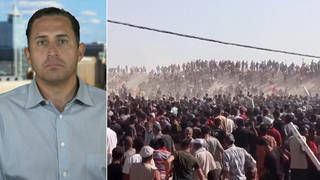
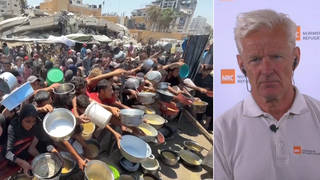
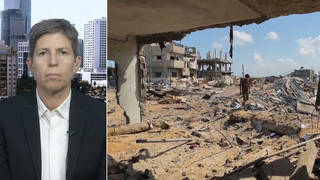






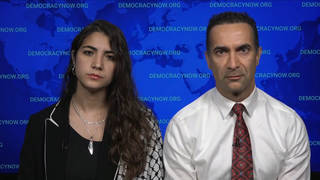

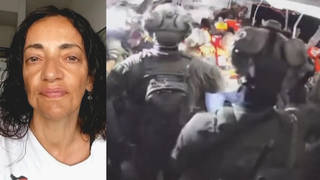
Media Options